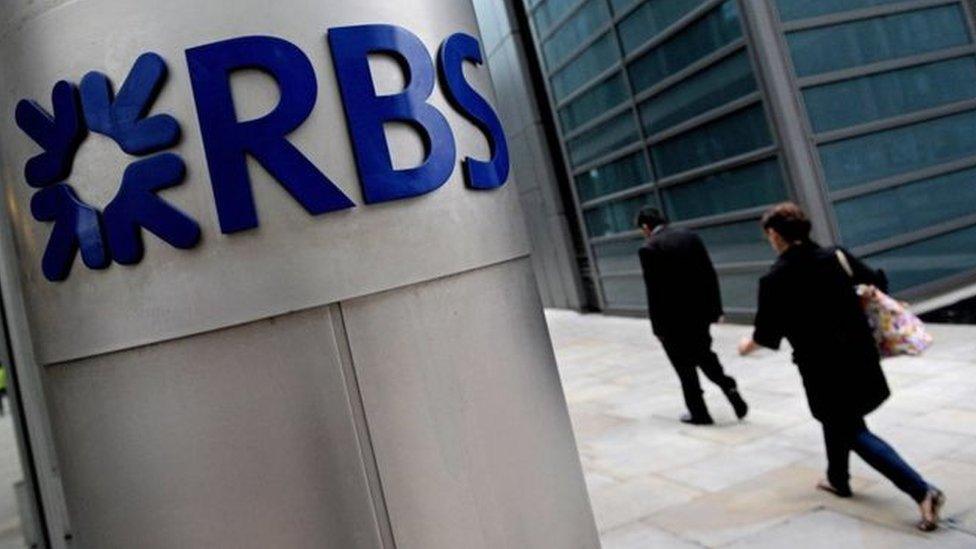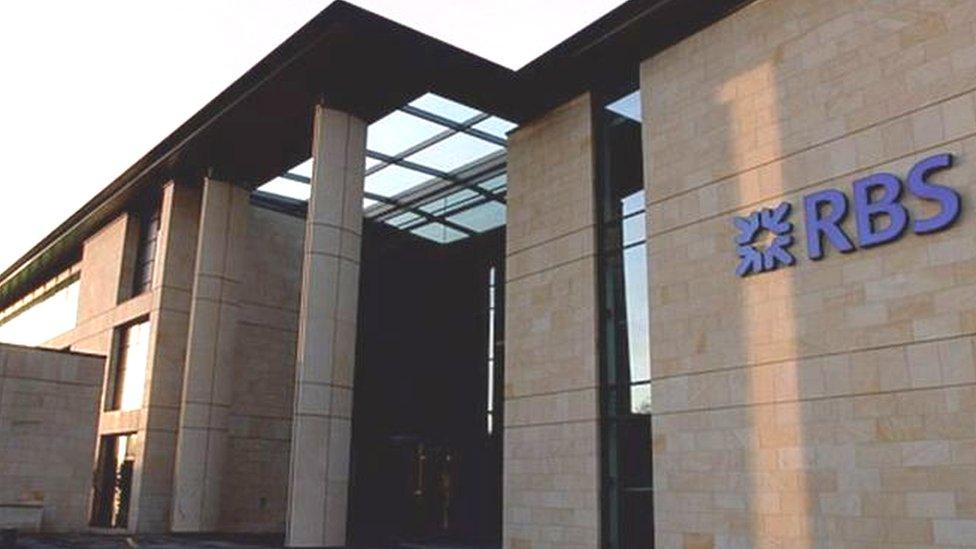RBS reboot is a crashing symbol
- Published

Royal Bank of Scotland today loses its brand status, to become merely a part of NatWest Group plc
Customers will notice little change, but the symbolism is big, in repairing the reputational damage from the 2008 crash
It's not the only one to have lost either corporate clout or its brand. Clydesdale Bank has only a few months left, as it becomes Virgin Money
It's been headquartered in Edinburgh since 1727, but from today, there will no longer be a company called Royal Bank of Scotland plc headquartered in the capital.
If you're a customer, you shouldn't see much change. The name will remain on Scottish branches, on banknotes and on your chequebook, if you still have such a thing.
If you're an investor, you'll notice that RBS plc has disappeared. As of today, with a name change at Companies House in Edinburgh, it will be NatWest Group plc.
This is part of the process of rebooting the brand, after a long struggle to get it out from under the long shadow of the Fred Goodwin era, and the catastrophe of 2008. Now the brand is being booted out of view, except for viewers in Scotland.
The practical effects may be small, but the symbolism is not. It's partly to do with the arrival of a new chief executive last November. Alison Rose's two predecessors had the task of turning around the bank's financial performance.
Her job is to continue that, adapting to rapid change in the market, and to repair the continued reputational damage from 2008 and much that followed from that.
That has been evident from the Net Promoter Scores used by banks to see how they are viewed by customers. The survey asks customers if they would recommend their bank to others.

Fred Goodwin led RBS into its 2008 crash
The answer from individual and business customers of RBS has been much more negative than positive. NatWest's net promoter scores have been positive, and it's the brand that's recognised by the vast majority of customers, in England and Wales.
To Alison Rose, it's a matter of alignment with that majority of customers, and she's playing down the link between rebranding and residual harm from the association with the collapse and bailout.
As chief executive, she says the name is important, that the heritage remains part of what NatWest will be, but it is how NatWest Group plc does business that defines it.
And through the Covid-19 crisis, with more than £10bn pushed out in government-backed loans through 50,000 staff swiftly shifted to home-working (until next year, we learned this week), she's got a good story to tell.
Corporate clout
For a bit more heritage, National Westminster Bank plc was taken over by Royal Bank of Scotland, in a transformational move that put then boss Sir George Mathewson and his acolyte Fred Goodwin on the fast track to becoming, briefly and disastrously, the world's biggest bank.
NatWest was notoriously inefficient, and Goodwin earned his reputation by shredding its then operations, and bringing them rapidly into line with RBS.
The success of that was what persuaded him, and RBS investors, to chase ABN Amro, the Dutch bank that turned out to be loaded with toxic assets. The rest is history, and not a happy tale.

Part of the RBS headquarters at Gogarburn is now home to a financial technology lab
For a bit more context, Bank of Scotland has been in a similar position to RBS since Halifax Bank of Scotland was taken over by Lloyds during the 2008 crisis.
It instantly lost the corporate clout at its HQ on the Mound in Edinburgh, with ownership by Lloyds Banking Group in London. At RBS, likewise, corporate power shifted to London, but its HQ remained in Gogarburn, to the west of Edinburgh. In further symbolism, much of Fred Goodwin's executive suite has been turned into an entrepreneurs' incubator and financial technology lab.
The Clydesdale Bank is also going through a rebranding. Although delayed by the health crisis, it is on track to rebadge by January all its branches and signage as Virgin Money. So too with its Yorkshire Bank brand.
As Virgin Money, it remains headquartered in Glasgow, with a new HQ under construction. It will continue to print Clydesdale Bank notes, though they will appear to be issued by a bank, or at least a heritage brand, that no longer exists.
